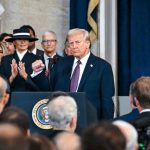Ed Whelan writes that President Trump may adjourn Congress as a means to instantly confirm his entire cabinet without any confirmation hearings. In an earlier post, Ed writes that this approach may risk the Court overruling Justice Breyer’s Noel Canning majority opinion, and adopting Justice Scalia’s concurrence.
I maintain that Justice Scalia’s opinion is correct on originalist grounds, as I noted in my earlier post. And I would be happy to see Justice Breyer’s majority opinion repudiated. But even so, is this potential plan inconsistent with Justice Scalia’s concurrence?
Under Scalia’s opinion, the President could only fill a vacancy that arises during the recess of the Senate. Trump’s plan would only be feasible if these cabinet positions become vacant during the recess of the Senate. Presumably, the holdover Biden cabinet officials will be long gone on January 20. And, on January 20, I suspect the President will use the Vacancies Reform Act to detail friendly people already in the federal government to serve as acting cabinet officials. What if one of them were to resign during the presidentially-induced recess? That is, on January 21, Trump adjourns Congress, and all acting cabinet officials resign. Would those vacancies have arisen during the recess of the Senate? Or, would the relevant starting point be when the last-confirmed official resigned? I don’t know how the Recess Appointments Clause, as understood by Scalia, interacts with the Vacancies Reform Act. I doubt anyone has given this issue much thought.
There is a second issue. Under Justice Scalia’s majority opinion, the President can only make a recess appointment during an inter-session recess, and not during an intra-session recess. That is, the President can make a recess appointment during the recess between sessions, and not during the recess in the middle of a session. Would a presidential-induced recess be an inter-session recess or an intra-session recess? This power has never been exercised before, so there is no precedent.
I had always thought this clause would cause an inter-session recess. At the Framing, intra-session recesses were very rare. Generally, Congress would meet for continuous periods, taking only short breaks, and then take very long inter-session breaks. To the extent this power was more likely to be used, it would be used to decide when to conclude one session, and begin another. But I don’t know. I do think it is the case that this clause was not designed to trigger the President’s recess appointment power. But that is a separate question from what kind of recess this power would trigger.
Those who joined the Noel Canning majority may very soon regret their choice.
The post Could President Trump Recess Appoint His Entire Cabinet Under Justice Scalia’s <i>Noel Canning</i> Concurrence? appeared first on Reason.com.






